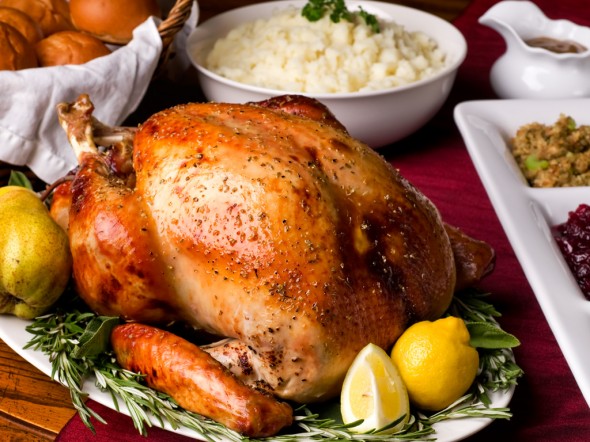Thanksgiving is quickly approaching. Maybe you’re thinking of inviting family and friends over; maybe you already have plans. Regardless, there’s sure to be a turkey involved. Unfortunately, though turkeys are supposed to be the stars of the dinner table on Thanksgiving, they seldom deliver a truly memorable performance. The main culprit? Dryness. It’s just too easy to overcook old Tom Turkey, and some of us have almost given up hope. But, with a lot of fairy dust (read: salt) and a little luck, you can have a delicious, juicy, and superstar turkey on your Thanksgiving table this year.
To brine, or not to brine?
You’ve heard about brines before. Who hasn’t? A few years ago, brining was all the rage. But, more recently, it has seemed like brining is out and something new—dry brining (an oxymoron if I ever heard one) is in. What is a dry brine? And is wet brining really a bad idea these days? To find out, let’s take a look at how brining works.
How Brining Works:
In his excellent article for Serious Eats, J. Kenji Lopez-Alt writes about why brining works and failing to brine does not. It’s all about the turkey proteins. Forget osmosis (well, okay, so there’s a little bit of osmosis), but mostly this is all about denaturing. When you add salt to raw turkey and let it sit over night, the protein sheaths that bind the muscle cells in the turkey meat together fall apart. Freed from the protein sheaths, the bundles of muscle cells loosen up and the muscle cells spread apart, leaving more room for…water.
That‘s right, water. Usually, when a turkey cooks, the protein sheaths around the muscle cells straighten, pushing any water in the turkey meat out and into your pan drippings. But when salt has denatured the protein sheaths, they can’t tighten up the way they used to, and they can’t expel water from your turkey meat with the same force either. Now, when you cook your turkey, it will be juicier—and harder to overcook—than if you had not applied that magical salt.
So wait a minute, you say, if it’s all about salt, why do you need a brine—a salt solution—as opposed to just plain salt? Well, by soaking your turkey in salt and water, you enable more water to be trapped in and around the muscle cells due to some small amount of osmosis, and you make the denaturing process happen more quickly. That said, a dry brine should still help keep your turkey’s protein sheaths denatured and its meat juicy. In short, both wet and dry brining work.
Three Steps to a Perfect Brine:
No matter whether you use a wet or a dry brine, we know that Martha Stewart has the perfect step-by-step guide to helping you make your turkey sparkle. Here are her basic methods for both:
1)  The day before the big day (Thanksgiving), combine 1 quart of water, 1 ½ cups kosher salt, and any aromatics you choose in a pot and bring them to a boil. Let cool for five minutes.
2)  Line a 5-gallon container with a plastic bag. Place the turkey in the bag. Add your salt mixture, 6 more quarts of water, and refrigerate overnight (up to 24 hours), flipping turkey once mid-brine.
3)Â Â Remove turkey from brine, pat dry, and let stand for one hour before roasting.
1)Â Â Combine 2/3 of a cup of kosher salt with aromatics of your choosing and rub over the inside and the outside of the turkey.
2)  Place turkey in a large oven bag or other plastic bag and seal tightly. Place on a baking sheet and refrigerate for 48 hours.
3)Â Â Remove turkey from bag and let stand at room temperature for one hour before roasting.
Either the wet or the dry brine will ensure a turkey that is juicier than a turkey with no brining at all. Thanks, Martha!
A Turkey in Good Taste:
Whether you’re using a wet or a dry brining method, you’ll want to add some flavors to your brine—who wants a turkey that just tastes salty?  Luckily, there are a whole slew of “aromatics” or ingredients that can help give your holiday bird a little more pep. Whole peppercorns, allspice, garlic, citrus peel, brown sugar, dried chiles—all add delicious flavor. And of course, you can’t forget the fresh herbs! Chop up some fresh rosemary, fresh parsley, fresh thyme, or fresh sage, and your brine, whether dry or wet, will be full of garden-fresh flavor. So get brining! And guarantee that your turkey steals the Thanksgiving dinner-table show!


